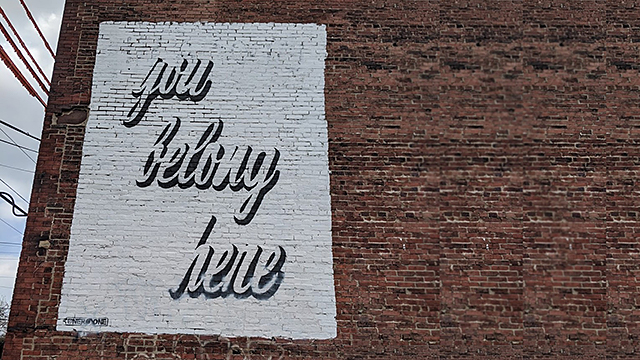
To all Friends everywhere:
Greetings from a gathering of Philadelphia Yearly Meeting Young Adult Friends, together from many different homes for Annual Sessions, July 29–August 2, 2020. Many of us gathered from the lands around Philadelphia, on the traditional homelands of the Lenni Lenape. We humbly acknowledge that many or all of us are settlers here, and live on stolen lands.
Young Adult Friends joined together Wednesday night, presenting ourselves with pictures, words, star signs, gifs and laughter. Many Friends experienced this welcoming activity as an expansive and joyful one, despite our separate locations, and we came back to the space opened in that spirit-filled way for the three succeeding nights.
Throughout the week we explored our emotions together. Grief has weighed heavily on Friends—as it has on others—for months. After the collective experience of Zenaida’s beautiful, resonant poetry, we came together around a short story about fear and grief. We practiced lectio divina, centering love in the text, in our lives, and in the world. We recognized in the passage we explored together, and again Friday night in Naomi’s talk “The Fire of the Light,” that grief, fear, and anger should not be dangerous to express. Anger is not antithetical to community. Decision making that excludes the possibility of expressing these emotions does a disservice to our members and to our community’s capacities. Anger, felt in response to injustice, can be a reminder to ground ourselves, so we can do the work.
We are grateful to see ourselves reflected in the Friday keynote speaker, Naomi Madaras and the poet in residence, Zenaida Peterson. Their powerful messages spoke to the spirit of the moment we live in, moments of abolition, uprising, and solitude. Indeed, we are all called to be responsive to this moment, and that spirit demands that we evolve and grow. Part of our evolution should be critically considering what we call “Quaker practice.” All our practices have been shaped by the culture by which they were surrounded. In America, white supremacist culture has always been part of those surroundings. What parts of the practices we have inherited are perpetuating oppression? What parts of the practices bring Truth to the surface of our Meeting? These must be separated and it is our choice, as a yearly meeting, to maintain them and pull them apart. How can we carefully tease apart that which will nourish the future of our faith, from that which closes it off and diminishes it?
One Friend gave a message that they worry about the source of the Quaker tendency to avoid anger and conflict. Do we fear that our shared beliefs are not strong enough to hold us together through it? Do we doubt the existence of the power that binds us? Unfortunately, we feel that the letter penned last April by the former clerks of Philadelphia Yearly Meeting, fed this fear. In point 8, the clerks insinuate that expression of feeling is manipulation or “ appeals to emotion.” By requiring Friends to leave emotions at the meeting room door, we are asking them not to be their whole selves in our meetings. We are missing out on the important insights that feelings of anger can bring to the gathering. We should not be discouraged from bringing our fullest selves to worship.
When a message rises, it does not need to be palatable. Spontaneity has been, from the beginning, a necessary part of Friends meetings. In our own meetings for worship, Friends hold messages of babbling babies, song and dance, and much else that is unexpected. Young Adult Friends do not draw the line at anger or grief. We must let it rise as we do all messages. Our concept of the inner light is more than something tentative: it is bright and can be harsh.
Friday night, we came together to share a practice treasured across many branches of tradition since the fourteenth century, that of contemplative prayer. Just as we are called to meditate on God in order to “pierce the cloud,” we reflected, we are called too to meditate on suffering.
In this moment of solitude, we are being asked to confront a great deal of suffering. We try to manage our suffering and one other’s suffering; domesticate it, tame it, package it, and send it off to disappear. Prayer is a practice of being present, staying turned toward the thing we are afraid to look at, and moving through it with God. At the Uprisings for George Floyd, protestors knelt in silence for 8 minutes and 46 seconds, the same amount of time an officer knelt on Floyd’s neck, closing his pathway to air, and taking his life, violently and from a place of power. In this silence we are able to confront how long 8 minutes and 46 seconds is, staying turned toward George Floyd’s death, and the racism that led to his murder and the murder of so many Black and Brown people. Love and grief and anger go together. Looking away from suffering in our communities and relationships is neglect. We cry because we care. We are angry because we love.
Zenaida read on Thursday night, “My grief prays/ lights a candle for each new loss/ They melt without fire these days.” Their words are deeply personal testimony, offered to our Yearly Meeting in abundant care. The threads of Spirit reached out from their work to every one of our hearts. And they brought into clear relief the urgency of Naomi’s call the following night. Paying attention to the emotional responses too often silenced in Friends spaces is critical, if those threads are to reach beyond these Sessions. Young Adult Friends, as both the present and the future of this community, want to participate in and inherit a yearly meeting that can hear grief and anger, because without these, our prayers are shallow.
P.S. To all Friends everywhere, abolish the police. Love, Young Adult Friends